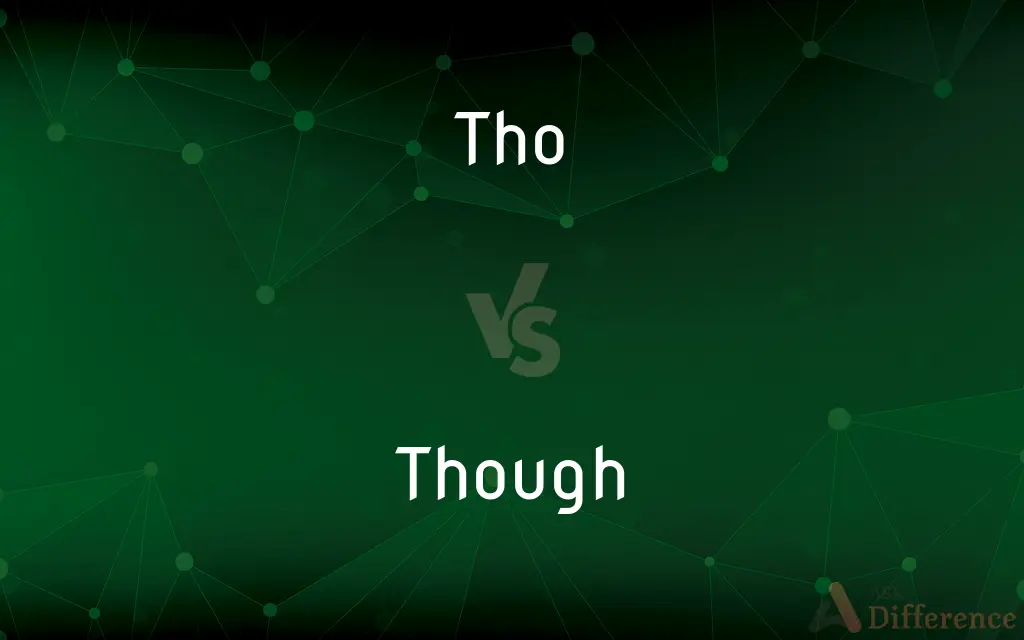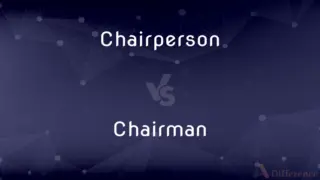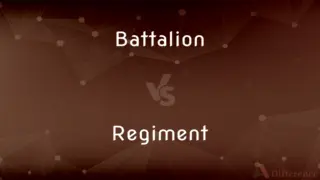Tho vs. Though — What's the Difference?
By Tayyaba Rehman & Maham Liaqat — Updated on March 17, 2024
"Tho" is an informal, abbreviated spelling of "though," often used in casual writing or digital communication. "Though" is the formal version, used in standard written and spoken English to indicate contrast or an afterthought.

Difference Between Tho and Though
Table of Contents
ADVERTISEMENT
Key Differences
"Tho" is a colloquial abbreviation of "though," reflecting a trend towards more concise and informal communication, especially on social media and in text messages. This abbreviation is part of a broader shift in language that favors brevity, particularly in informal contexts. On the other hand, "though" is the standard spelling of the word, employed in formal writing, academic texts, and professional communication. It serves various grammatical functions, including as a conjunction, preposition, and adverb, to introduce contrast or an additional point.
In written dialogue or characters' thoughts within fiction, writers might use "tho" to convey a character's casual tone or informal speech pattern. This usage helps to create a more authentic and relatable character voice. Conversely, "though" is used in more formal narratives or expository texts, where maintaining a standard level of English is crucial for clarity and readability.
The choice between "tho" and "though" can also reflect the medium of communication. For instance, "tho" is more likely to appear in text messages, online forums, and social media comments, where space is limited and speed is valued. "Though" remains the preferred form in emails, reports, essays, and other documents where formal language is expected or required.
Understanding the difference between "tho" and "though" is important. Students are taught to use "though" in academic writing and standardized tests, where adherence to formal language conventions is assessed. However, they might encounter or use "tho" in informal settings or creative writing as a stylistic choice to convey a conversational tone.
The use of "tho" signifies a broader trend of language evolution influenced by digital communication. It reflects how language adapts to changes in communication technology and societal norms. Meanwhile, "though" represents the continuity of formal linguistic standards and the importance of context in language usage.
ADVERTISEMENT
Comparison Chart
Formality
Informal
Formal
Usage Context
Casual writing, digital communication
Formal writing, academic texts, professional communication
Function
Abbreviated form, reflects casual tone
Full form, used as conjunction, preposition, adverb
Preferred Medium
Text messages, social media
Emails, reports, essays, formal documents
Reflection on Language
Shows language evolution, influenced by digital communication
Represents formal linguistic standards, continuity in language
Compare with Definitions
Tho
Reflects a casual tone or informal speech.
He's late, tho he promised to be on time.
Though
Reflects continuity and context importance in language usage.
Though challenged, they persevered.
Tho
Informal abbreviation of "though."
I wanted to go, tho it was raining.
Though
Maintains formal linguistic standards.
Though he was not the first choice, he proved to be the best.
Tho
Part of language evolution influenced by technology.
Can't believe he said that, tho.
Though
Formal version used to indicate contrast or an additional point.
Though it was raining, the event continued.
Tho
Used to convey contrast or an additional point informally.
She's strict, tho fair.
Though
Employed in academic and professional writing.
The strategy was effective, though it had some drawbacks.
Tho
Common in digital communication for brevity.
Nice job on the project, tho.
Though
Serves as a conjunction, preposition, and adverb.
He agreed, though reluctantly.
Tho
Though.
Though
Despite the fact that; although
He still argues, though he knows he's wrong. Even though it was raining, she walked to work.
Tho
(obsolete) Those; they.
Though
Conceding or supposing that; even if
Though they may not succeed, they will still try. See Usage Note at although.
Tho
Then; thereupon.
Though
However; nevertheless
Snow is not predicted.
We can expect some rain, though.
Tho
Alternative spelling of though
Though
(Informal) Used as an intensive
Wouldn't that beat all, though?.
Tho
(dialectal) When.
Though
(conjunctive) Despite that; however.
I'm not paid to do all this paperwork for you. I will do it this once, though.
Tho
The.
Though
(degree) Used to intensify statements or questions; indeed.
"Man, it's hot in here." — "Isn't it, though?"
Tho
Those.
This knowen tho that be to wives bound.
Though
Despite the fact that; although.
Though it is risky, it is worth taking the chance.
Tho
Then.
To do obsequies as was tho the guise.
Though
(archaic) If, that, even if.
We shall be not sorry though the man die tonight.
Tho
Though.
Though
Granting, admitting, or supposing that; notwithstanding that; if.
Though he slay me, yet will I trust in him.
Not that I so affirm, though so it seem.
In the vine were three branches; and it was as though it budded.
Tho
A branch of the Tai languages
Though
However; nevertheless; notwithstanding; - used in familiar language, and in the middle or at the end of a sentence.
I would not be as sick though for his place.
A good cause would do well, though.
Though
Despite the fact that;
Even though she knew the answer, she did not respond
Though
(postpositive) however;
It might be unpleasant, though
Common Curiosities
Can "though" and "tho" be used interchangeably?
While they have the same meaning, their use depends on the formality of the context; "though" is for formal settings, and "tho" for informal ones.
Why do people use "tho" instead of "though"?
People use "tho" for convenience, especially in quick, informal digital communication.
Can the use of "tho" in texts influence spoken English?
Yes, the use of informal abbreviations like "tho" can influence spoken English, especially in casual conversations.
Is "tho" acceptable in formal writing?
No, "tho" is considered informal and should not be used in formal writing.
Does the use of "tho" indicate a decline in language standards?
Not necessarily; it reflects language evolution and the influence of digital communication, not a decline in standards.
Why is "though" important in academic writing?
"Though" is important for its role in expressing contrast or additional information, adhering to formal language conventions.
How does digital communication impact language standards like the use of "though"?
Digital communication encourages brevity and informality, leading to the increased use of abbreviations like "tho."
How do "though" and "tho" function grammatically?
Both can function as conjunctions, prepositions, and adverbs, but "though" is the correct form in formal grammar.
How do "tho" and "though" compare in terms of conveying tone?
"Tho" conveys a more casual or informal tone, while "though" is neutral and formal.
Is "tho" recognized by dictionaries?
Some dictionaries may list "tho" as an informal or colloquial variant of "though."
How does the use of "tho" affect readability?
In informal contexts, "tho" can enhance readability by matching the conversational tone; in formal contexts, it may detract from clarity.
What are some strategies for knowing when to use "tho" or "though"?
Consider your audience and the context; use "though" for formal or academic settings and "tho" in casual, informal communication.
Is it important to teach the difference between "tho" and "though" in education?
Yes, understanding the difference is important for language proficiency and appropriate usage in varying contexts.
Can "though" be used at the beginning of a sentence?
Yes, "though" can be used at the beginning of a sentence to introduce a contrastive statement.
What role does context play in choosing between "tho" and "though"?
Context is crucial; the choice depends on the level of formality required by the communication medium, audience, and purpose.
Share Your Discovery

Previous Comparison
Chairperson vs. Chairman
Next Comparison
Battalion vs. RegimentAuthor Spotlight
Written by
Tayyaba RehmanTayyaba Rehman is a distinguished writer, currently serving as a primary contributor to askdifference.com. As a researcher in semantics and etymology, Tayyaba's passion for the complexity of languages and their distinctions has found a perfect home on the platform. Tayyaba delves into the intricacies of language, distinguishing between commonly confused words and phrases, thereby providing clarity for readers worldwide.
Co-written by
Maham Liaqat














































